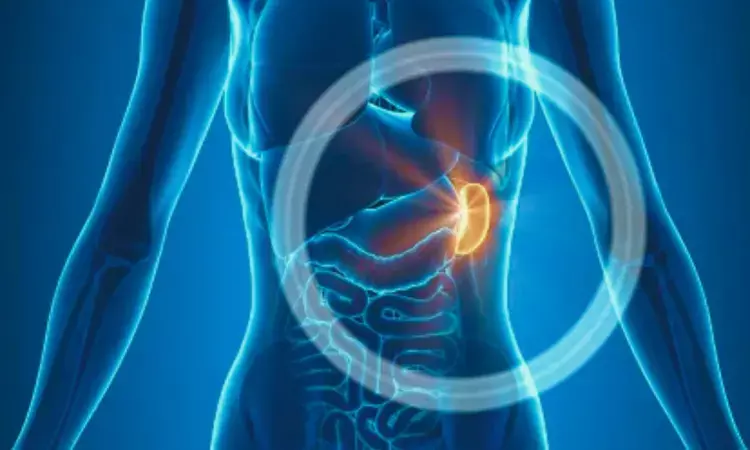- Home
- Medical news & Guidelines
- Anesthesiology
- Cardiology and CTVS
- Critical Care
- Dentistry
- Dermatology
- Diabetes and Endocrinology
- ENT
- Gastroenterology
- Medicine
- Nephrology
- Neurology
- Obstretics-Gynaecology
- Oncology
- Ophthalmology
- Orthopaedics
- Pediatrics-Neonatology
- Psychiatry
- Pulmonology
- Radiology
- Surgery
- Urology
- Laboratory Medicine
- Diet
- Nursing
- Paramedical
- Physiotherapy
- Health news
- Fact Check
- Bone Health Fact Check
- Brain Health Fact Check
- Cancer Related Fact Check
- Child Care Fact Check
- Dental and oral health fact check
- Diabetes and metabolic health fact check
- Diet and Nutrition Fact Check
- Eye and ENT Care Fact Check
- Fitness fact check
- Gut health fact check
- Heart health fact check
- Kidney health fact check
- Medical education fact check
- Men's health fact check
- Respiratory fact check
- Skin and hair care fact check
- Vaccine and Immunization fact check
- Women's health fact check
- AYUSH
- State News
- Andaman and Nicobar Islands
- Andhra Pradesh
- Arunachal Pradesh
- Assam
- Bihar
- Chandigarh
- Chattisgarh
- Dadra and Nagar Haveli
- Daman and Diu
- Delhi
- Goa
- Gujarat
- Haryana
- Himachal Pradesh
- Jammu & Kashmir
- Jharkhand
- Karnataka
- Kerala
- Ladakh
- Lakshadweep
- Madhya Pradesh
- Maharashtra
- Manipur
- Meghalaya
- Mizoram
- Nagaland
- Odisha
- Puducherry
- Punjab
- Rajasthan
- Sikkim
- Tamil Nadu
- Telangana
- Tripura
- Uttar Pradesh
- Uttrakhand
- West Bengal
- Medical Education
- Industry
Rare case unravels uncommon Hematological Complication of typhoid Fever: A report

India: In a medical anomaly that has puzzled experts, a recent case report has unveiled an unusual hematological complication associated with typhoid fever, shedding new light on the complex manifestations of this infectious disease. This discovery underscores the importance of vigilant monitoring and comprehensive assessment in managing typhoid fever cases, especially in regions where the disease remains endemic.
Typhoid fever, caused by the bacterium Salmonella enterica serotype Typhi, is a systemic illness characterized by fever, abdominal pain, and gastrointestinal symptoms. While complications such as intestinal perforation and encephalopathy are well-documented, hematological abnormalities beyond leukopenia and thrombocytopenia are relatively rare.
The case report published in the Journal of the Association of Physicians of India describes the case of a young female who presented with complaints of severe left upper quadrant pain after being diagnosed with typhoid fever.
Computed tomography (CT) showed multiple wedge-shaped splenic infarcts. She was treated with antibiotics and was also started on antiplatelets. She completely recovered with this management, and antiplatelets were tapered off on subsequent visits.
The case is of a 25-year-old female patient with no known comorbidities who was referred to a hospital with complaints of high-grade fever for 9 days, which was associated with loose stools. She was diagnosed with typhoid fever from the referring hospital and was started on ceftriaxone. She then started complaining of chest pain, left-sided abdominal pain, and breathlessness. She had a family history of rheumatoid arthritis in her mother.
On examination, she was oriented and conscious, febrile, and had a temperature of 104°F. Her abdominal examination showed tenderness over the left hypochondrium, and her respiratory system showed signs of left-sided pleural effusion.
She was admitted, and baseline blood investigations were conducted. Her blood culture confirmed the diagnosis of Salmonella Typhi, which was sensitive to the antibiotic. Her serology for other tropical illnesses, such as dengue, malaria, leptospirosis, and scrub typhus, was negative.
On further evaluation, an abdomen ultrasound showed hepatomegaly, mild splenomegaly with an evolving abscess of size 8 × 7 cm. It was followed by contrast-enhanced computed tomography (CBCT) of the chest and abdomen, which revealed multiple wedge-shaped splenic infarcts and mild pleural effusion. The echocardiogram was unremarkable, and the thrombophilia panel was within normal range.
She was treated with antibiotics, nonsteroidal anti-inflammatory drugs, and fluid resuscitation and was put on oral antibiotics on discharge. A rheumatologist and hematologist took an opinion to exclude hypercoagulable states, blood-borne malignancy, autoimmune diseases, and collagen vascular diseases.
She was initiated on antiplatelets and continued for 6 months. Her follow-up ultrasound of the abdomen revealed a normal splenic echotexture and size.
“Splenic infarction is an unusual complication of typhoid fever, and there are only a few literature mentioned for the same,” the researchers wrote. “Common presentation is left-sided abdomen pain and tenderness. CT scan is the imaging modality of choice for suspected patients.”
“It is also crucial to exclude other common causes of splenic infarction. We have found a benefit with antiplatelet therapy and supportive treatment in our patient,” they concluded.
Reference:
John S, V A. An Unusual Hematological Complication of Typhoid Fever Case Report. J Assoc Physicians India 2024;72(5):101-102.
Dr Kamal Kant Kohli-MBBS, DTCD- a chest specialist with more than 30 years of practice and a flair for writing clinical articles, Dr Kamal Kant Kohli joined Medical Dialogues as a Chief Editor of Medical News. Besides writing articles, as an editor, he proofreads and verifies all the medical content published on Medical Dialogues including those coming from journals, studies,medical conferences,guidelines etc. Email: drkohli@medicaldialogues.in. Contact no. 011-43720751


